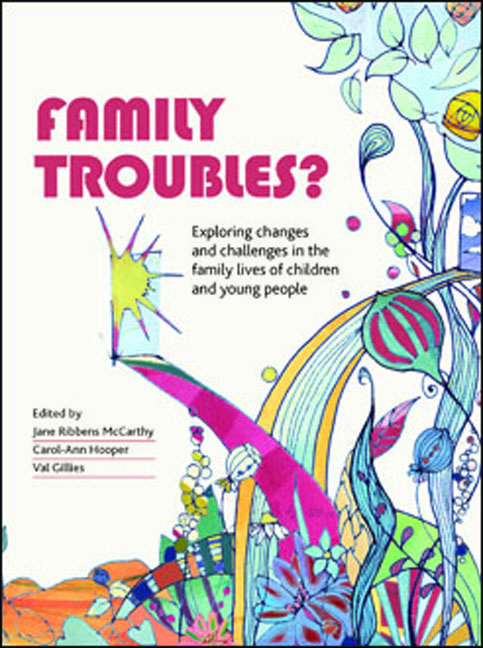Book contents
- Frontmatter
- Contents
- Notes on contributors
- Foreword
- Preface
- 1 Troubling normalities and normal family troubles: diversities, experiences and tensions
- Part One Approaching family troubles ? Contexts and methodologies :Introduction to Part One
- Part Two Whose trouble ? Conteste d definitions and practice: Introduction to Part Two
- Part Three The Normal, The Troubling And The Harmful?: Introduction to Part Three
- Part Four Troubles and transitions across space and culture: Introduction to Part Four
- Part Five Working With Families: Introduction to Part Five
- Index
2 - Cultural context, families and troubles
Published online by Cambridge University Press: 07 September 2022
- Frontmatter
- Contents
- Notes on contributors
- Foreword
- Preface
- 1 Troubling normalities and normal family troubles: diversities, experiences and tensions
- Part One Approaching family troubles ? Contexts and methodologies :Introduction to Part One
- Part Two Whose trouble ? Conteste d definitions and practice: Introduction to Part Two
- Part Three The Normal, The Troubling And The Harmful?: Introduction to Part Three
- Part Four Troubles and transitions across space and culture: Introduction to Part Four
- Part Five Working With Families: Introduction to Part Five
- Index
Summary
The cultural context provides a perspective that is core to understanding families and their troubles. Families around the world vary in the forms that they take, the circumstances in which they live and the troubles that they experience. There is not a single consensus definition of culture, of family or of trouble that offers an opportunity to explore how diversity and variability can contribute to understanding the connections among these phenomena. This chapter will first consider the relationship of the cultural context to understanding families and troubles and will then turn to a consideration of child maltreatment as an illustration of the complexities of these issues.
Families are fundamental building blocks of human societies. We spend most of our lifetimes as family members, from the family or families in which we are reared to the family or families that we form or relate to as adults. The ‘right’ to a family is prominent in the United Nations’ Convention on the Rights of the Child, and when families are disrupted or absent, a substitute arrangement with as many familial features as possible is most often sought (McCall et al, 2011). Yet, despite the centrality of families in social organisation and human development, families are rife with contradictions. Families, by their very nature, are at once both cooperative and conflictual, both stable and changing, and both safe and dangerous. ‘Troubles’ arise both from within and from outside families, and are variably experienced by different family members by virtue of attributes including age, gender, sibling position or family role.
The cultural context offers an important framework for understanding families and ‘troubles’. A major review of child development research identified culture as one of 10 major principles impacting human development, but yet one that was poorly studied and understood:
Culture influences every aspect of human development and is reflected in childrearing beliefs and practices designed to promote healthy adaptation.…
- Type
- Chapter
- Information
- Family Troubles?Exploring Changes and Challenges in the Family Lives of Children and Young People, pp. 27 - 34Publisher: Bristol University PressPrint publication year: 2013

